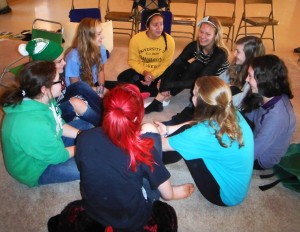When it comes to school bullying, I think we’ve got it all wrong.
2 girls, one 13 and the other 14, were bullied so severely last fall that their parents obtained restraining orders against the assailants, who were fellow students at their schools. Their story was published in the St. Louis Post Dispatch newspaper on january 3rd, and I hope readers walked away not with a sense of fear but instead with the resolve to push for schools to tackle this issue in a different manner.

Too much energy and focus is spent on reacting to assaults, after-the-fact, and not enough time and attention is spent working proactively with students. It’s not enough to have a 2 hour assembly in a crowded gym, with scary stories from victims and threats from teachers. You can create some tears and good intentions from such shows, but their effects don’t last long. What kids need is regular, consistent, preventative, and experiential social emotional-learning. And that means acknowledging that children need to learn skills in getting along, and allowing some time away from the 3 R’s to do so.
I have worked with classrooms of girls in schools for many years, and I have seen first-hand how valuable it is for them to sit on the floor and really get honest and real with each other. They need to learn to take responsibility for the learning environment, and to set their own intentions for what they want their class to look and feel like. This ownership is key to getting long-term cooperation and commitment. Girls must learn skills in: solving conflicts directly and effectively, building community, collaboration, speaking with authority while also listening and creating win-win solutions to problems, and how to stand up for themselves and each other.
Once they have been taught these skills, there still needs to be regular opportunities for them to clear the air, handle new conflicts, brainstorm solutions to problems that emerge, and to hold each other and the class accountable to any agreements they commit to. It’s not a mystery that when you put 25 girls together for 7 hours a day, stuff happens: feelings are hurt, people say disrespectful things, and they play with their social power. That’s why they need weekly class meetings and regular attention paid to how the community is doing. I also have groups plan and implement service projects to bring them all together, and create ways to celebrate and encourage each other regularly.
Students need a large dose of this preventative medicine. And it requires teachers, principals, and districts to allow the time required to implement it. Parents can play an important role in letting their school know that you see the value in such programs, and that you support taking some class time for social-emotional learning. Good research from SEL, Social Emotional Learning, backs up this type of education.
Encourage your teachers and principals to shift their focus from reacting to incidents to proactive community building. The kind of assaults reported on the news regularly should be a wake-up call for such action.
Very true! As a police lieutenant in charge of officers on high school campus’ I saw schools overreacting and leaning on the police to solve the problem. What you are saying to do is rare and so needed.